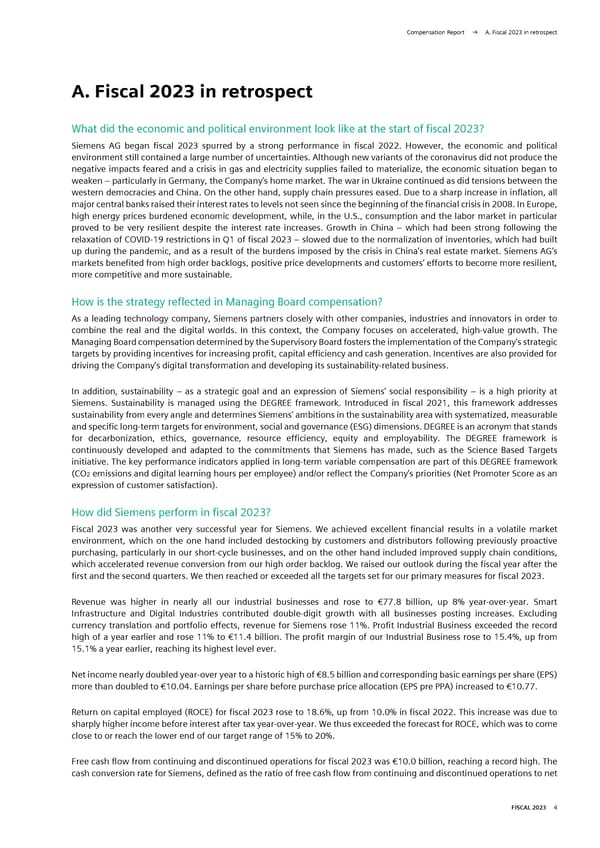Compensation Report → A. Fiscal 2023 in retrospect A. Fiscal 2023 in retrospect What did the economic and political environment look like at the start of fiscal 2023? Siemens AG began fiscal 2023 spurred by a strong performance in fiscal 2022. However, the economic and political environment still contained a large number of uncertainties. Although new variants of the coronavirus did not produce the negative impacts feared and a crisis in gas and electricity supplies failed to materialize, the economic situation began to weaken – particularly in Germany, the Company’s home market. The war in Ukraine continued as did tensions between the western democracies and China. On the other hand, supply chain pressures eased. Due to a sharp increase in inflation, all major central banks raised their interest rates to levels not seen since the beginning of the financial crisis in 2008. In Europe, high energy prices burdened economic development, while, in the U.S., consumption and the labor market in particular proved to be very resilient despite the interest rate increases. Growth in China – which had been strong following the relaxation of COVID-19 restrictions in Q1 of fiscal 2023 – slowed due to the normalization of inventories, which had built up during the pandemic, and as a result of the burdens imposed by the crisis in China’s real estate market. Siemens AG’s markets benefited from high order backlogs, positive price developments and customers’ efforts to become more resilient, more competitive and more sustainable. How is the strategy reflected in Managing Board compensation? As a leading technology company, Siemens partners closely with other companies, industries and innovators in order to combine the real and the digital worlds. In this context, the Company focuses on accelerated, high-value growth. The Managing Board compensation determined by the Supervisory Board fosters the implementation of the Company’s strategic targets by providing incentives for increasing profit, capital efficiency and cash generation. Incentives are also provided for driving the Company‘s digital transformation and developing its sustainability-related business. In addition, sustainability – as a strategic goal and an expression of Siemens’ social responsibility – is a high priority at Siemens. Sustainability is managed using the DEGREE framework. Introduced in fiscal 2021, this framework addresses sustainability from every angle and determines Siemens’ ambitions in the sustainability area with systematized, measurable and specific long-term targets for environment, social and governance (ESG) dimensions. DEGREE is an acronym that stands for decarbonization, ethics, governance, resource efficiency, equity and employability. The DEGREE framework is continuously developed and adapted to the commitments that Siemens has made, such as the Science Based Targets initiative. The key performance indicators applied in long-term variable compensation are part of this DEGREE framework (CO 2 emissions and digital learning hours per employee) and/or reflect the Company’s priorities (Net Promoter Score as an expression of customer satisfaction). How did Siemens perform in fiscal 2023? Fiscal 2023 was another very successful year for Siemens. We achieved excellent financial results in a volatile market environment, which on the one hand included destocking by customers and distributors following previously proactive purchasing, particularly in our short-cycle businesses, and on the other hand included improved supply chain conditions, which accelerated revenue conversion from our high order backlog. We raised our outlook during the fiscal year after the first and the second quarters. We then reached or exceeded all the targets set for our primary measures for fiscal 2023. Revenue was higher in nearly all our industrial businesses and rose to €77.8 billion, up 8% year-over-year. Smart Infrastructure and Digital Industries contributed double-digit growth with all businesses posting increases. Excluding currency translation and portfolio effects, revenue for Siemens rose 11%. Profit Industrial Business exceeded the record high of a year earlier and rose 11% to €11.4 billion. The profit margin of our Industrial Business rose to 15.4%, up from 15.1% a year earlier, reaching its highest level ever. Net income nearly doubled year-over year to a historic high of €8.5 billion and corresponding basic earnings per share (EPS) more than doubled to €10.04. Earnings per share before purchase price allocation (EPS pre PPA) increased to €10.77. Return on capital employed (ROCE) for fiscal 2023 rose to 18.6%, up from 10.0% in fiscal 2022. This increase was due to sharply higher income before interest after tax year-over-year. We thus exceeded the forecast for ROCE, which was to come close to or reach the lower end of our target range of 15% to 20%. Free cash flow from continuing and discontinued operations for fiscal 2023 was €10.0 billion, reaching a record high. The cash conversion rate for Siemens, defined as the ratio of free cash flow from continuing and discontinued operations to net FISCAL 2023 4
 Siemens Report FY2023 Page 154 Page 156
Siemens Report FY2023 Page 154 Page 156